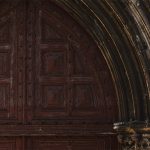When ridicule bites
I
lift up my eyes to you,
to
you who sit enthroned in heaven.
2 As
the eyes of slaves look to the hand of their master,
as
the eyes of a female slave look to the hand of her mistress,
so our eyes look to the Lord our God,
till
he shows us his mercy.3 Have mercy on us, Lord, have mercy on us,
for we have endured no end
of contempt.
4 We have endured no end
of ridicule from the
arrogant,
of contempt from the proud.
What I like about these Songs of Ascents, Psalms 120 to 134, is that people actually sang them on their way to Jerusalem. The things they saw and experienced and all their emotions are contained in this little songbook within the songbook that we call Psalms.
In Psalm 121 the writer posed the question as to whether or not to should lift up his or her eyes to the hills for help. The hills being the place where the Canaanite idols were worshipped. The response was, ‘No.’ Help came always and only from Yahweh.
Psalm 123 shows the pilgrims now lifting their eyes to the Lord. And yet when you think about it, it would have been so easy to place their dependence upon the things that seemed to so captivate their neighbours. The Canaanites thought that the Baals controlled the weather and the seasons, thus controlling the economy. And we are dependent upon the economy, aren’t we? To see their neighbours offering sacrifices for a good harvest must have raised the thought of putting “two bob each way” as an older generation used to say. Surely it couldn’t hurt?
Apart from economics, one of the other driving forces of the push towards such syncretism — syncretism being the blending of different religions — would have been the scorn and contempt heaped upon them by their neighbours.
I can almost imagine hearing this psalm sung by the pilgrims. I sense their weariness with the contempt in which they have been held. Ridiculed, I would imagine, for their pigheaded belief in one God who made the heavens and the earth. ‘Why not ease off a little,’ you can hear neighbours suggesting. ‘Why not drop this idea of exclusiveness? Look where it’s getting you — a long, hard journey all the way to Jerusalem. Loosen up a little. Blend in.’
“O Lord…we have endured much contempt. We have endured much ridicule…”
So we are not just guessing about what is going on, the psalmist actually tells us.
This was a time for looking to Yahweh for mercy. And it is here that this pilgrim song strikes a chord for me. Our media have been relentless in their pursuit of Christian values, haven’t they? Perhaps it is just that we are on the receiving end which colours our thinking, but it seems that the mocking and derision meted out against Christians is more severe than what is meted out to other social and religious groups. And yet our journey must continue through this landscape of contempt. And it will continue until we reach the heavenly city.
The cry for mercy in this Psalm is not a cry born of guilt for sin. It is a cry for relief. The incessant, threatening derision of the surrounding ideologies can be oppressive. It can get under our skin. “Have mercy on us, O Lord, have mercy on us.” Give us some relief.
Some of us will feel this more than others depending on where we work and even our family dynamics. Or how keen we are to follow the political and social debates of our day. But it does touch us all.
As the eyes of slaves look to the hand of their master,
as the eyes of a female slave look to the hand of her mistress,
so our eyes look to the Lord our God.
Did you notice that the position taken here is not one of the warriors fighting back? Not an army flexing its muscles by demonstrating its power in numbers or skills in the media or politics. The position the psalmist takes is one of a slave or maid looking to his or her master for protection and relief.
It like that…I am not much of a warrior! A servant is in the hands of his or her master. It is the responsibility of the master to provide everything that is needed including protection. So while we might have those who are gifted in public debate, most of us will quietly depend upon the one who has promised to bring us through. To the one of whom the pilgrims sang a few kilometres back along the road in Psalm 121, “The Lord will keep you from all harm–he will watch over your life…both now and forevermore.”
The pilgrimage continues through all of our lives. We are dependent upon the master through all of our lives. And we have hope to sustain us through all of our lives. Because, as the psalmist reminds us, Yahweh—our God—is the One whose throne is in the heavens.
At times mocking and derision will get under our skin. Perhaps a TV program; an ABC Q and A; a slanging match on a talk show; articles in Fairfax newspapers… And at those times we need to turn our anger and frustration upward, just as did the psalmist, “our eyes look to the Lord our God till he shows us his mercy.” Kicking the cat achieves nothing. Talking to Yahweh achieves everything.
Suggestion: You could pray this Psalm exactly as it is, word for word.
Peace to you,
Ray Barnett






